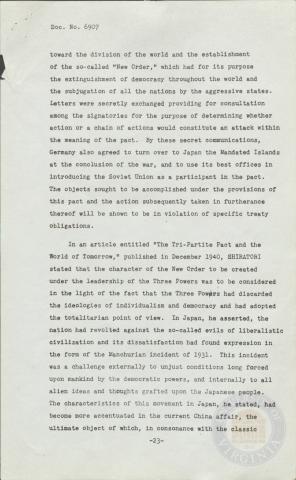
Page 23
| Parent | Doc. 6907 - Collaboration Between Japan, Germany and Italy, Volume 1 - Opening Statement |
|---|---|
| Date | |
| Language | English |
| Collection | Tavenner Papers & IMTFE Official Records |
| Box | Box 15 |
| Folder | Japan, Germany, Italy Collaboration Vol 1 |
| Repository | University of Virginia Law Library |
Doc. No. 6907
toward the division of the world and the establishment of the so-called wNew Order,H which had for its purpose the extinguishment of democracy throughout the world and the subjugation of all the nations by the aggressive states. Letters were secretly exchanged providing for consultation among the signatories for the purpose of determining whether action or a chain of actions would constitute an attack within the meaning of the pact. By these secret communications, Germany also agreed to turn over to Japan the Mandated Islands at the conclusion of the war, and to use Its best offices ln introducing the Soviet Union as a participant In the pact. The objects sought to be accomplished Tinder the provisions of this pact and the action subsequently taken in furtherance thereof will be shown to be in violation of specific treaty obligations.
In an article entitled MThe Tri-Partite Pact and the World of Tomorrow,n published in December 1940, SHIRATORI stated that the character of the New Order to be created under the leadership of the Three Powers was to be considered in the light of the fact that the Three Powers had discarded the ideologies of individualism and democracy and had adopted the totalitarian point of view. In Japan, he asserted, the nation had revolted against the so-called evils of liberallstlc civilization and its dissatisfaction had found expression in the form of the Manchurian incident of 1931. This incident was a challenge externally to unjust conditions long forced upon mankind by the democratic powers, and internally to all alien ideas and thoughts grafted upon the Japanese people. The characteristics of this movement in Japan, he stated, had become more accentuated in the current China affair, the ultimate object of which, in consonance with the classic
